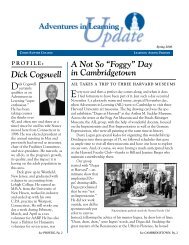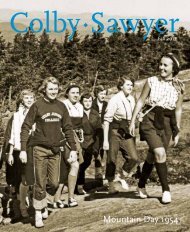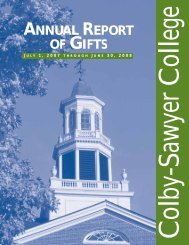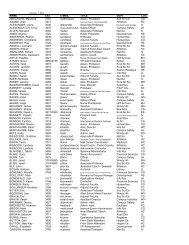A L U M N I M A G A Z I N E - Colby-Sawyer College
A L U M N I M A G A Z I N E - Colby-Sawyer College
A L U M N I M A G A Z I N E - Colby-Sawyer College
Create successful ePaper yourself
Turn your PDF publications into a flip-book with our unique Google optimized e-Paper software.
A Poet Talks to Herself<br />
Assistant Professor of Humanities Ewa Chrusciel,<br />
a native of Poland, has published her first book in<br />
English, Strata, which she describes as “a hybrid text<br />
incorporating letters and poems (that) investigates issues<br />
of identity, mediation, protest, Central European politics<br />
and the Sublime.” Below are excerpts of an interview in<br />
which Chrusciel asked, and answered, questions about<br />
her work that she has always wished to be asked.<br />
Why do you write in your non-native<br />
language?<br />
Experience determines the choice of the language.<br />
To change your language you must change your life.<br />
I changed my life by flying to the U.S.A. Writing in<br />
English is the work of smuggling metaphors from one<br />
language into another. It is a work of bilingualism<br />
and mistranslation, so it is a constant mental shuffling<br />
between the languages, between these two conceptualizations<br />
of the world. Writing in two languages creates<br />
bewilderment for us and for our readers. It changes us.<br />
It transports us to new places.<br />
And writing poems is a way of being in two<br />
places at once?<br />
Writing comes from a longing for the presence of another<br />
place, for bilocation. My desire for linguistic bilocation is<br />
related to my bilingualism, which means inhabiting two<br />
cognitive places at once. Bilingualism is for those who are<br />
unable to let it go, who nest in two places at once. For<br />
those who dwell in impossibility. Poems bilocate to express<br />
what is ineffable. To give tribute to Mystery; to the insufficiency<br />
of any language.<br />
Why so many animals and birds in your poems?<br />
I see Beauty in animals. I see Mystery in animals. And, as<br />
Flannery O’Connor says, Beauty will save the world. I think<br />
Beauty has teeth and it terrifies. Poetry is a tribute to such<br />
Beauty. That wildness comes from the fact that poems are<br />
tigers that jump out of us. That wildness is my response<br />
to Mystery.<br />
Do we write poems or do poems write us?<br />
If we think we already know what to write, we never<br />
encounter the subject of a poem that should “write us.”<br />
Likewise, if we already know what we are reading, we<br />
never learn anything about literature. Without the sense<br />
of surprise, bewilderment and discovery, there is no<br />
literature; there is no learning. The opening up of a subject<br />
is what Jorie Graham calls the “poem’s occasion,” when<br />
we let ourselves meander and encounter the subject which<br />
changes us.<br />
a poem<br />
Children swing on a rope down to a river. Water is shocked<br />
by this splutter. We stay on shore, even though we know the<br />
water is master of gravitation and will save us from flight.<br />
Unlike Mary’s Yes, a swing into hearts ajar.<br />
I dream of the day when my syllables will hold rough<br />
wood, my letters will be sewn in a stove or fireplace. It’s not<br />
the sacrifice we resist, but the beauty. The intensity of the<br />
instance burns. For it has to turn into another instance. There<br />
is nobility in asking the same thing over and over.<br />
Children swing on a rope down to a river. Water is shocked<br />
by this splutter. The truth burns us before it falls away. We<br />
remain on shore.<br />
When did she start to witness evanescence? The animals saw<br />
her suffering in light and saw that it was good and took her<br />
light in suffering. A dog started to bleed. A cat died after she<br />
left. Life was not enough. The occasional splutter of light. The<br />
simplicity of smile. There is nobility in asking.<br />
Children swing on a rope down to a river.<br />
Nico’s Aya speaks of light and evanescence. The blessing of<br />
his Grandmother. Woven DNA patterns. Now it has holes<br />
and no warmth, but the child holds onto it and repeats:<br />
“AYA’s church.” Not knowing that Aya, his grandmother, wove<br />
him into Being. There were many blankets. The plants saw<br />
and knew it was good. There is nobility in weaving the same<br />
blanket over and over. We are impatient to rid ourselves of<br />
time. It takes centuries for Arctic plants to spread and form a<br />
quaking mat, a circumference of clarities.<br />
From Strata by Ewa Chrusciel (published by Emergency Press)<br />
The poem above was inspired by “that famous bog area in New London (N.H.),<br />
...covered by a quaking mat of plants,” according to the poet.<br />
The self-interview was published on nervousbreakdown.com in May 2011. To read the entire interview and poems from Strata visit<br />
www.colby-sawyer.edu/currents/ewa.html.<br />
SUMMER 2011 13









